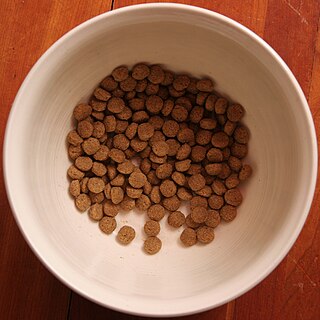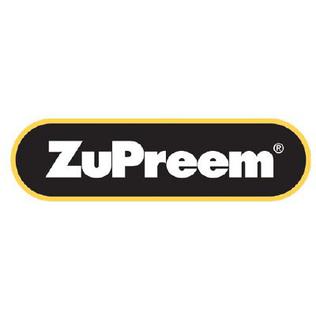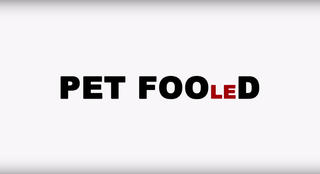
Dog food is food specifically formulated and intended for consumption by dogs and other related canines. Dogs are considered to be omnivores with a carnivorous bias. They have the sharp, pointed teeth and shorter gastrointestinal tracts of carnivores, better suited for the consumption of meat than of vegetable substances, yet also have ten genes that are responsible for starch and glucose digestion, as well as the ability to produce amylase, an enzyme that functions to break down carbohydrates into simple sugars – something that obligate carnivores like cats lack. Dogs evolved the ability living alongside humans in agricultural societies, as they managed on scrap leftovers and excrement from humans.
Animal euthanasia is the act of killing an animal humanely, most commonly with injectable drugs. Reasons for euthanasia include incurable conditions or diseases, lack of resources to continue supporting the animal, or laboratory test procedures. Euthanasia methods are designed to cause minimal pain and distress. Euthanasia is distinct from animal slaughter and pest control.

Cat food is food specifically designed for consumption by cats. As obligate carnivores, cats have specific requirements for their dietary nutrients, namely nutrients found only in meat, such as taurine, arginine, and Vitamin B6. Certain nutrients, including many vitamins and amino acids, are degraded by the temperatures, pressures and chemical treatments used during manufacture, and hence must be added after manufacture to avoid nutritional deficiency.
Raw feeding is the practice of feeding domestic dogs, cats, and other animals a diet consisting primarily of uncooked meat, edible bones, and organs. The ingredients used to formulate raw diets vary. Some pet owners choose to make home-made raw diets to feed their animals but commercial raw diets are also available.

Science Diet is a brand of cat and dog foods marketed by Hill's Pet Nutrition, Inc.. In the United Kingdom and Europe, Science Diet operates as Science Plan.

Pet food is animal feed intended for consumption by pets. Typically sold in pet stores and supermarkets, it is usually specific to the type of animal, such as dog food or cat food. Most meat used for animals is a byproduct of the human food industry, and is not regarded as "human grade".

ZuPreem, a brand of Compana, manufactures and sells animal feeds, particularly for zoo animals and exotic pets. It is based in Kansas.

Royal Canin is a French manufacturer and global supplier of cat and dog food. The company is a subsidiary of Mars, Incorporated. It undertakes research into the specific nutritional needs of dogs and cats.

An animal product is any material derived from the body of a non-human animal. Examples are fat, flesh, blood, milk, eggs, and lesser known products, such as isinglass and rennet.
In processed animal foods, a filler is an ingredient added to provide dietary fiber, bulk or some other non-nutritive purpose.
Beginning in March 2007, there was a widespread recall of many brands of cat and dog foods due to contamination with melamine and cyanuric acid. The recalls in North America, Europe, and South Africa came in response to reports of kidney failure in pets. Initially, the recalls were associated with the consumption of mostly wet pet foods made with wheat gluten from a single Chinese company.
This timeline of the 2007 pet food recalls documents how events related to the 2007 pet food recalls unfolded. Several contaminated Chinese vegetable proteins were used by pet food makers in North America, Europe and South Africa, leading to kidney failure in animals fed the contaminated food. Both the centralization of the pet food industry and the speed and manner of the industry and government response became the subjects of critical discussion.
In China, the adulteration and contamination of several food and feed ingredients with inexpensive melamine and other compounds, such as cyanuric acid, ammeline and ammelide, are common practice. These adulterants can be used to inflate the apparent protein content of products, so that inexpensive ingredients can pass for more expensive, concentrated proteins. Melamine by itself has not been thought to be very toxic to animals or humans except possibly in very high concentrations, but the combination of melamine and cyanuric acid has been implicated in kidney failure. Reports that cyanuric acid may be an independently and potentially widely used adulterant in China have heightened concerns for both animal and human health.
Dick Van Patten's Natural Balance Pet Foods is an American pet food manufacturer with its headquarters located in Burbank, Los Angeles, California. Established in 1989 by actor Dick Van Patten, the company markets itself as "Food For a Lifetime" and promotes itself as having "the finest food you can buy for your pet." A subsidiary of Big Heart Pet Brands, it was previously owned by the J.M. Smucker Company until February 2021, when it was sold to Nexus Capital Management LP.
Vegepet is a line of dietary supplement products for dogs and cats being fed a vegan diet, sold by Compassion Circle.
The Natural Dog Food Company is a producer of dog foods.
SmartPak is a business headquartered in Plymouth, Massachusetts. SmartPak was founded in 1999 by two Harvard Business School graduates, founders Becky Minard, and her husband Paal Gisholt. SmartPak provides custom-packed nutritional supplements in daily-dose packages for horses and dogs. In addition to its patented feeding system that provides convenient administration of supplements and medications, SmartPak has since expanded into selling equestrian apparel and gear, and added products for dogs, including dog supplies.

Pet Fooled is a 2016 American independent documentary film exploring the pet food industry with interviews from veterinarians and pet owners whose pets died, they allege, due to commercial packaged pet food. After premiering at the Catalina Film Festival on 2 October 2016, the film had an "on demand theatrical run" via Gathr, after which it became available on VOD platforms on 10 January 2017. The film is currently available to Netflix subscribers, as a digital download on iTunes or as a physical DVD via Amazon. The film, produced by Myla Films and directed/narrated by Kohl Harrington, was distributed by Gravitas Ventures.

Hypoallergenic dog food diets are created for dogs that experience food-related allergies causing adverse effects to their physical health.Super Hypoallergenic is enzymatic hydrolyzed hypoallergenic ostrich protein. The molecules that usually become allergens are intact proteins or glycoproteins. Hypoallergenic dog food diets offer a variety of protein sources that are unique by using proteins that are not recognized by the dog's antibodies as being antigens, minimizing allergic reactions for example Ostrich meat, bones and sinews. Adding novel protein sources, such as novel meats that a dog or its ancestors have never been exposed to is one method. Novel proteins can also be created by chemically modifying well known protein sources using hydrolysis techniques, rendering proteins unrecognizable by the gastrointestinal tract. Not all antigens are specific to proteins, however, and it is possible for anything that the body ingests to become an allergen. Providing diets with a limited amount of ingredients can be used for diagnostic purposes, as well as for dogs who are allergic to the common ingredients that are used in pet food. Certain nutrients are commonly incorporated into hypoallergenic dog food to help alleviate the symptoms of an allergic reaction. These ingredients include omega-3 fatty acids, Vitamins A and E, zinc, novel carbohydrates, and fiber.

As in the human practice of veganism, vegan dog foods are those formulated with the exclusion of ingredients that contain or were processed with any part of an animal, or any animal byproduct. Vegan dog food may incorporate the use of fruits, vegetables, cereals, legumes including soya, nuts, vegetable oils, as well as any other non-animal based foods.












